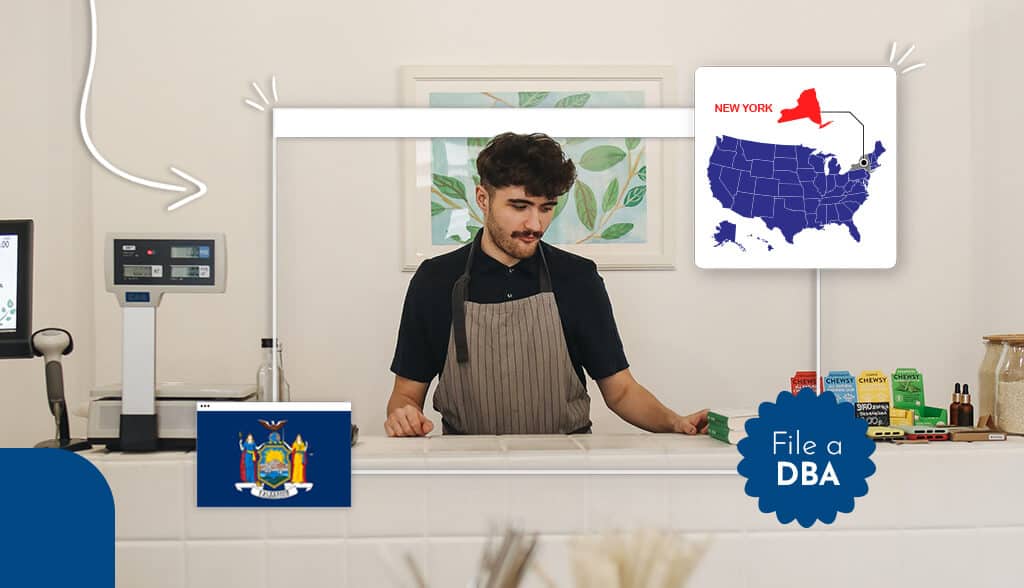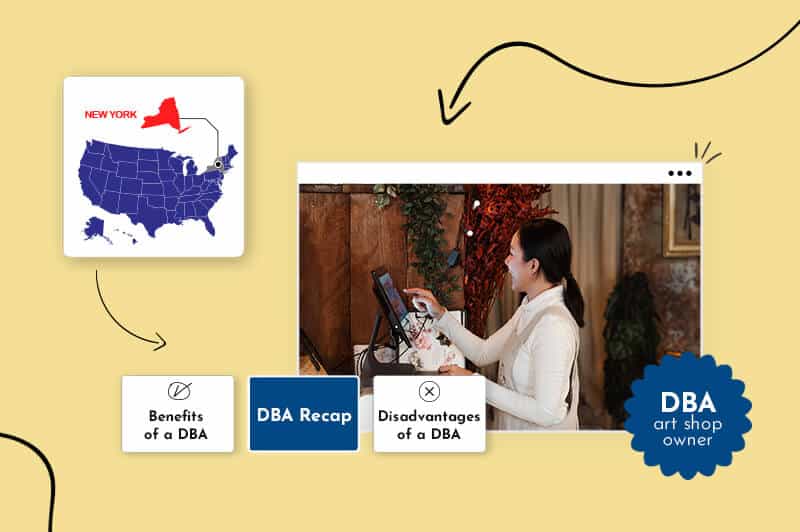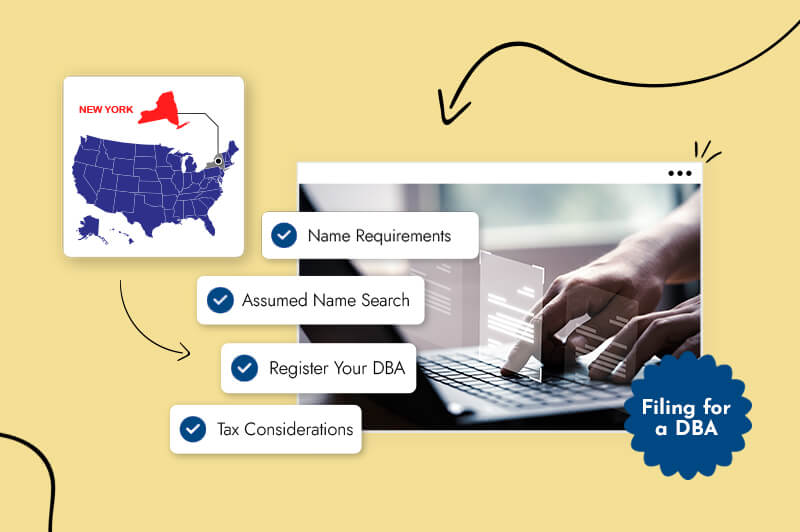
Businesses choose their official names when they open an LLC in NY, and firms that don’t formally register simply operate under the owner’s personal name. In either case, sometimes a business wants to operate under a name other than its official one.
If you own a company and want to use a different name, a Doing Business As (DBA) filing enables you to use another name for commercial activities.

A DBA (Doing Business As) name is a trading name that you can use for business activities within New York State.
All types of businesses can file for the right to use a trading name after they’ve registered with the state (if required). The option to use a DBA in New York is available to sole proprietorships, limited liability corporations (LLCs), limited partnerships (LPs), corporations and nonprofits.
Having a DBA grants your business the right to use its fictitious business name (FBN) for most purposes. Products and services can be marketed under the name, payments can be sent and received via accounts in the name, and you can generally use it for most activities outside of tax, legal and similar issues.
The DBA name can be referred to as a trade name, fictitious name, or assumed name. All of these terms refer to a name that was chosen by filing a Doing Business As form.
Companies use DBA assumed names for several different reasons. The following are some of the main benefits that the name offers and the times when you might want to use one:
The process of obtaining a DBA involves one of the easiest documents to file; you only need to file a certificate with your local county clerk and pay the associated fee. This is the simplest and fastest way to obtain a business name.
When a company wants a specific name and expects others to pursue it in the near future, the firm can use a DBA form to rapidly secure rights to the name. It might subsequently acquire further rights, such as a trademark.
The simplicity also ensures that virtually all business owners can quickly file for DBAs. No special knowledge is needed.
There’s no requirement to have a formal business entity before (or after) filing for a DBA. Sole proprietors who currently operate under their personal names can obtain DBAs without changing their business structures or filing additional documents.
There is also no requirement to have an employer identification number (EIN) in order to obtain a DBA. This is a moot point for LLCs, LPs, corporations and nonprofits that have employees and thus already need EINs for different reasons. On the other hand, sole proprietors and single-member LLCs without employees don’t have to unnecessarily apply for EINs.
A DBA doesn’t completely obscure a firm’s official name; government agencies and entities that sue the business will still be able to access the official name. A DBA does allow your company to use a fictitious name in routine operations, however, thus concealing the official business name from most customers and the general public.
The general benefits and other features of a DBA make it particularly useful in certain situations. While these are far from the only applications, here are some examples of how you might utilize a DBA:
Because they simply provide fictitious names for commercial activities, DBAs have disadvantages compared to other business filings. There are three notable limitations to a DBA.
The primary drawback of a DBA is more of a limitation than a disadvantage. A DBA assumed name confers no legal protection.
Even though a business may operate under an assumed name, the company itself can still be sued. So too can business owners if the structure allows (e.g. sole proprietorship).
For this reason, a DBA shouldn’t be confused with the LLC business structure. An LLC does provide a limited liability protection, and it may prevent business owners from being sued except in extreme situations. A DBA doesn’t do this.
Of course, obtaining a DBA doesn’t prevent you from forming an LLC (or other legally protective business structure). You can file for both.
Without a trademark secured, a DBA does little to prevent other companies from using highly similar names. Other businesses in New York, and even in your local county and municipality, might use names that are remarkably like yours.
As mentioned, you can file for a trademark simultaneously while quickly obtaining a DBA.
Since a DBA isn’t an actual business structure, it provides no tax benefits. The assumed name doesn’t impact how your firm is taxed or what it pays in taxes.
Again, you can still file for an LLC or corporate business structure that does provide tax benefits.
No business entity in New York is required to use a DBA. This is an entirely optional filing, and whether you should file for a New York DBA is dependent upon your business strategy.
You might want a DBA for marketing, privacy or other purposes (see Benefits), but you certainly don’t have to file for one.

The process of filing for a New York DBA is fairly straightforward and simple, but there are a few details to be aware of. Below are some of the requirements that your company’s assumed name must meet, along with instructions on how to go about actually requesting that name.
DBA naming requirements are similar to those of LLCs, with one notable exception. Whereas an LLC must use “limited liability company,” “LLC,” or “L.L.C.” in its name, a DBA doesn’t have to contain any indication like this. Marketing under an assumed name that doesn’t need to contain “LLC” has obvious benefits.
Other than this, DBA assumed names and business names in general must meet the following requirements:
Before filing a DBA with your local county clerk (see below), first make sure that your desired name is available.
The easiest way to conduct a business name search in New York is through the Department of State – Division of Corporations’ website. You can search by “Entity Name” to see whether any business is operating under a similar name.
A disclaimer on the search indicates that it shouldn’t be used to determine the acceptability of an entity name (business name). This is an easy way to check a name, however, and it’s a simple preliminary step to take before filing for a DBA. The county clerk will conduct a more official search when you file.
Registering a DBA in New York involves filing a Business Certificate with a county clerk. You can file in any county where you conduct business. Although it’s usually most convenient to file wherever your company is located, it’s not necessarily required.
Most of New York State uses the same form, but filing in Manhattan requires a different form. Online filing isn’t available since you must give the form to your local county clerk rather than the state government.
Using an assumed name without filing for (and receiving) a DBA primarily carries civil penalties and seldom causes any criminal prosecution. It’s even fairly uncommon for the state to press civil charges for the offense.
A few main issues arise from using a DBA without filing for one:
As mentioned, a DBA isn’t a business structure and thus has no tax consequences. It doesn’t change how your company is taxed nor what it pays in taxes (see Disadvantages).
Whether you run a small sole proprietorship or a large LLC, a Doing Business As assumed name gives your company flexibility in what name it uses. You can easily file for one if you’d like to operate under a different name for any reason.
This portion of our website is for informational or educational purposes only. Tailor Brands is not a law firm, and the information on this website does not constitute legal advice. All statements, opinions, recommendations, and conclusions are solely the expression of the author and provided on an as-is basis. Accordingly, Tailor Brands is not responsible for the information and/or its accuracy or completeness. It also does not indicate any affiliation between Tailor Brands and any other brands, services or logos on this page.
Products
Resources
©2025 Copyright Tailor Brands